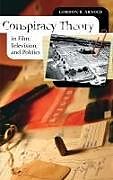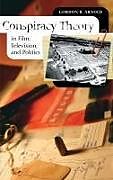Conspiracy Theory in Film, Television, and Politics
Einband:
Fester Einband
EAN:
9780275994624
Untertitel:
Englisch
Genre:
Sozialwissenschaften allgemein
Autor:
Arnold Gordon B.
Herausgeber:
Praeger
Anzahl Seiten:
200
Erscheinungsdatum:
30.09.2008
ISBN:
978-0-275-99462-4
Informationen zum Autor Gordon Arnold has taught at several colleges, including Montserrat College of Art in Beverly, Massachusetts. He lives in the Boston area. Klappentext Since the assassination of John F. Kennedy, motion pictures and television productions-some based on historical fact and conjecture, others clearly fanciful-have embraced the idea that conspiracies shape many events, hide others, and generally dictate much of the course of modern life, often to the disadvantage of the average person. As a result, conspiracy theories have developed into a potent undercurrent in American politics. By the 1990s, it was not unusual to find conspiracies used as explanations for a wide range of political events that would otherwise seem to have quite ordinary explanations. Thus, a vast right-wing conspiracy was suggested as the source of Bill Clinton's troubles, just as conspiracy-like machinations of the liberal media were used to explain why the picture of world events did not coincide with conservative views. And this is to say nothing of the bitter arguments that still erupt over varying explanations for the attacks of 9/11.Regardless of a person's opinion about such claims, what these and many other examples clearly show is that conspiracy-theory explanations have penetrated mainstream American thought. Here, author Gordon Arnold examines the evolution of this cultural climate in the United States. Conspiracy Theory in Film, Television, and Politics examines the intersection of various film and television productions in the context of unfolding political developments. The chapters follow this story chronologically, showing how screen media have both reflected and shaped the cultural milieu in which traumatic events and political controversies have been interpreted with increasing cynicism. The work also reviews the original contexts in which film, television, and political manifestations of conspiracy ideas first appeared. Zusammenfassung By the 1990s! it was not unusual to find conspiracies used as explanations for a wide range of political events that would otherwise seem to have quite ordinary explanations. Inhaltsverzeichnis Chapter 1 Conspiracy Theory in the American Imagination Chapter 2 The Red Menace and Its Discontents Chapter 3 Conspiracy in the New Frontier Chapter 4 Shock and Upheaval Chapter 5 Scandal and Skepticism Chapter 6 Vision and Re-Vision Chapter 7 A New Age of Conspiracy Chapter 8 Belief and Disbelief ...
Autorentext
GORDON B. ARNOLD is Professor of Liberal Arts at Montserrat College of Art in Beverly, Massachusetts, where he has taught courses in film, media, and politics for many years. He was previously a reference librarian and library director at public and academic libraries. His publications include the book The Politics of Faculty Unionization (2000), as well as articles in Library Journal, Change, and Labor Studies Journal.
Klappentext
Since the assassination of John F. Kennedy, motion pictures and television productions-some based on historical fact and conjecture, others clearly fanciful-have embraced the idea that conspiracies shape many events, hide others, and generally dictate much of the course of modern life, often to the disadvantage of the average person. As a result, conspiracy theories have developed into a potent undercurrent in American politics. By the 1990s, it was not unusual to find conspiracies used as explanations for a wide range of political events that would otherwise seem to have quite ordinary explanations. Thus, a vast right-wing conspiracy was suggested as the source of Bill Clinton's troubles, just as conspiracy-like machinations of the liberal media were used to explain why the picture of world events did not coincide with conservative views. And this is to say nothing of the bitter arguments that still erupt over varying explanations for the attacks of 9/11. Regardless of a person's opinion about such claims, what these and many other examples clearly show is that conspiracy-theory explanations have penetrated mainstream American thought. Here, author Gordon Arnold examines the evolution of this cultural climate in the United States. Conspiracy Theory in Film, Television, and Politics examines the intersection of various film and television productions in the context of unfolding political developments. The chapters follow this story chronologically, showing how screen media have both reflected and shaped the cultural milieu in which traumatic events and political controversies have been interpreted with increasing cynicism. The work also reviews the original contexts in which film, television, and political manifestations of conspiracy ideas first appeared.
Zusammenfassung
By the 1990s, it was not unusual to find conspiracies used as explanations for a wide range of political events that would otherwise seem to have quite ordinary explanations.
Inhalt
Chapter 1 Conspiracy Theory in the American Imagination
Chapter 2 The Red Menace and Its Discontents
Chapter 3 Conspiracy in the New Frontier
Chapter 4 Shock and Upheaval
Chapter 5 Scandal and Skepticism
Chapter 6 Vision and Re-Vision
Chapter 7 A New Age of Conspiracy
Chapter 8 Belief and Disbelief

Leider konnten wir für diesen Artikel keine Preise ermitteln ...
billigbuch.ch sucht jetzt für Sie die besten Angebote ...
Die aktuellen Verkaufspreise von 6 Onlineshops werden in Realtime abgefragt.
Sie können das gewünschte Produkt anschliessend direkt beim Anbieter Ihrer Wahl bestellen.
Loading...
Die aktuellen Verkaufspreise von 6 Onlineshops werden in Realtime abgefragt.
Sie können das gewünschte Produkt anschliessend direkt beim Anbieter Ihrer Wahl bestellen.
| # | Onlineshop | Preis CHF | Versand CHF | Total CHF | ||
|---|---|---|---|---|---|---|
| 1 | Seller | 0.00 | 0.00 | 0.00 |
